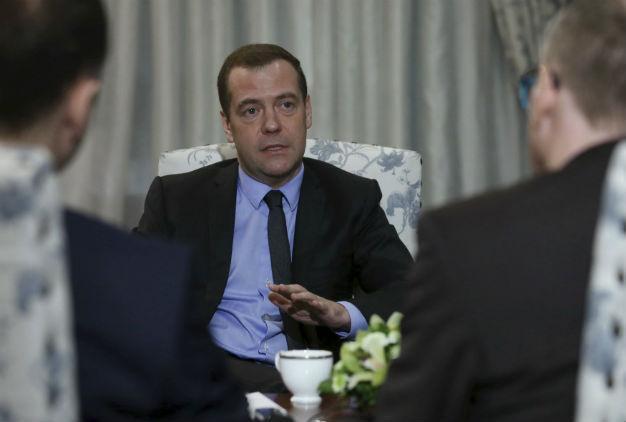Russia raises possibility of ‘world war’ if Syria talks fail
MUNICH – Reuters

REUTERS photo
Russian Prime Minister Dmitry Medvedev raised the specter of a possible “world war” if international powers fail to negotiate an end to the conflict in Syria, warning against any ground operations by U.S. and Arab forces.Medvedev, speaking to Germany’s Handelsblatt newspaper on the eve of talks between major powers on Syria in Munich, said the United States and Russia, and even Turkey, must exert pressure on all sides in the conflict to secure a ceasefire.
“Our estimate is negative because all ground operations, as a rule, lead to permanent wars. Look at what is going on in Afghanistan and a number of other countries,” he said when asked about Saudi Arabia’s offer last week to supply ground troops if a U.S.-led operation were mounted against the Islamic State of Iraq and the Levant (ISIL).
“The Americans must consider – both the U.S. president and our Arab partners – whether or not they want a permanent war,” Medvedev said, according to the transcript of the interview published on the website of the Russian Prime Ministry.
“Are they hoping for a quick victory? This doesn’t happen in reality, particularly in the Arab world. They have everyone fighting everyone,” he added.
Medvedev said everyone should “sit down at the negotiating table” to prevent a world war.
“We can do it by using, among other things, the harsh measures that are being implemented by Russia, the Americans, and even, with all reservations, the Turks, rather than start yet another war in the world,” he said. “We know well what scenarios are followed in this context.”
Meanwhile, Syria's President Bashar al-Assad told AFP he saw a risk that Saudi Arabia or Turkey could launch a military intervention in his country.
Speaking in Damascus on Feb. 11, he said he "doesn't rule out" such an intervention, but said that his armed forces "will certainly confront it."
However, as Medvedev was issuing his warnings U.S. Defense Secretary Ashton Carter was saying that the United Arab Emirates had agreed to send special forces soldiers to Syria to assist in the development of local Sunni Arab fighters focused on recapturing Raqqa, ISIL’s self-proclaimed capital.
Carter made the comment after meeting Feb. 12 at his Brussels hotel with his counterpart from the United Arab Emirates, the Associated Press reported.
Carter declined to say how many Emirati special forces would go to Syria. He said they would be part of an effort led by the United States and bolstered by Saudi special forces to train and enable local Arab fighters who are motivated to recapture Raqqa.
The U.S. war plan for fighting ISIL in Syria and Iraq is designed to unseat the extremists in Raqqa and Mosul, which is the group’s main stronghold in northern Iraq.
Carter also told reporters that however the proposed suspension of Syrian civil war hostilities is implemented, as announced in Munich, the U.S. will continue combating ISIL in Syria.
He vowed there will be “no let-up” in the war effort against ISIL.
















